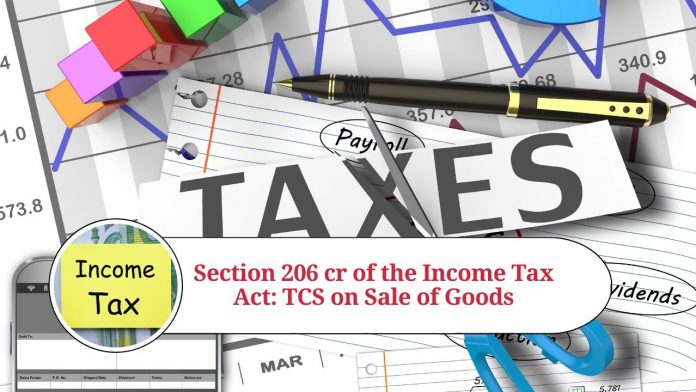Section 206 cr of the Income Tax Act: An Overview
Tax collection is a crucial aspect of any government’s revenue generation. In India, the Income Tax Act, 1961, governs the collection of income tax from various sources. One of the provisions under this act is Section 206 cr, which deals with the collection of tax at source (TCS) on the sale of certain goods.
What is TCS?
Tax collected at source (TCS) is a tax collected by the seller from the buyer at the time of sale. The seller then deposits this tax with the government. TCS is applicable in cases where the transaction value exceeds a certain threshold limit.
What is Section 206 cr?
Section 206 cr of the Income Tax Act mandates the collection of TCS on the sale of certain goods. The goods covered under this section include:
- Alcoholic liquor for human consumption
- Tendu leaves
- Timber obtained under a forest lease
- Timber obtained by any mode other than under a forest lease
- Any other forest produce not being timber or tendu leaves
- Scrap
- Minerals, being coal or lignite or iron ore
The threshold limit for TCS under this section is INR 50 lakhs. This means that if the sale value of any of the above goods exceeds INR 50 lakhs, the seller must collect TCS from the buyer.
Rate of TCS
The rate of TCS under Section 206 cr varies depending on the type of goods sold. For instance, in the case of alcoholic liquor for human consumption, the TCS rate is 1%. On the other hand, for tendu leaves, the TCS rate is 5%.
Deposit of TCS
Once the seller collects TCS from the buyer, they must deposit it with the government within a specific time frame. The due date for depositing TCS is the 7th of the month following the month in which TCS was collected.
Exemption from TCS
There are certain exemptions under Section 206 cr. For instance, TCS is not applicable in cases where the buyer is the central or state government, a local authority, or a public sector undertaking. Similarly, TCS is not applicable in cases where the goods are exported out of India.
Conclusion
In conclusion, Section 206 cr of the Income Tax Act mandates the collection of TCS on the sale of certain goods. It is essential for sellers to understand the goods covered under this section, the threshold limit for TCS, the rate of TCS, and the due date for depositing TCS. Failure to comply with the provisions of this section can result in penalties and other legal consequences. Therefore, it is crucial for sellers to ensure compliance with Section 206 cr to avoid any adverse repercussions.
Read more useful content:
Frequently Asked Questions (FAQs)
Q. What is Section 206 cr of the Income Tax Act?
Section 206 cr of the Income Tax Act deals with the collection of Tax Collected at Source (TCS) on the sale of certain goods.
Q. What are the goods covered under Section 206 cr?
The goods covered under Section 206 cr include alcoholic liquor for human consumption, tendu leaves, timber obtained under a forest lease, timber obtained by any mode other than under a forest lease, any other forest produce not being timber or tendu leaves, scrap, and minerals such as coal, lignite, or iron ore.
Q. What is the threshold limit for TCS under Section 206 cr?
The threshold limit for TCS under Section 206 cr is INR 50 lakhs. If the sale value of any of the above goods exceeds INR 50 lakhs, the seller must collect TCS from the buyer.
Q. What is the rate of TCS under Section 206 cr?
The rate of TCS under Section 206 cr varies depending on the type of goods sold. For instance, in the case of alcoholic liquor for human consumption, the TCS rate is 1%. On the other hand, for tendu leaves, the TCS rate is 5%.
Q. When must the seller deposit TCS with the government?
The seller must deposit TCS with the government within a specific time frame, which is the 7th of the month following the month in which TCS was collected.
Q. Are there any exemptions under Section 206 cr?
Yes, there are certain exemptions under Section 206 cr. For instance, TCS is not applicable in cases where the buyer is the central or state government, a local authority, or a public sector undertaking. Similarly, TCS is not applicable in cases where the goods are exported out of India.
Q. What are the consequences of non-compliance with Section 206 cr?
Failure to comply with the provisions of Section 206 cr can result in penalties and other legal consequences. Therefore, it is crucial for sellers to ensure compliance with Section 206 cr to avoid any adverse repercussions.




















